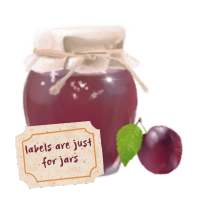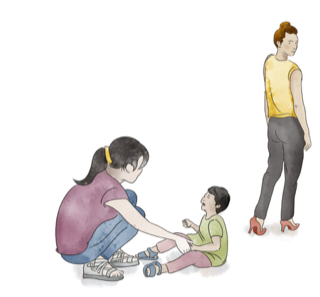Why are labels important?
There’s a lovely meme that says something along the lines of ‘labels are just for jars’. While I really like that sentiment, especially when it comes to our children with disability and developmental delay, I also think that (as with most memes) it needs nuancing.
Why? Labels are actually very important when used correctly. Think about it: labels help us to define our identity when they are used in a value-neutral way. Labels that define rather than confine help us to convey valuable information about ourselves and our needs.
And let’s face it, labels are ubiquitous. When you describe yourself, what do you use, if not labels? If someone asks me to tell them about myself, I say that I am a ‘mother’, a ‘wife’, an ‘academic’, a ‘peer worker’, a ‘writer’. These are all my labels, and they are ones that I am comfortable to accept and name.
But I am also ‘autistic’. I have a disability. These are equally my labels. Just like ‘mother’ or ‘wife’ or ‘academic’, individually the ‘autistic’ or ‘disability’ labels do not represent all that I am any more than ‘mother’ represents the totality of my experience. But they are nevertheless essential to my identity.
When we talk about labels, then, it is the quality of the label we use that is vital.
Crucially, as parents, the labels we use to help define our children set the tone for the way others perceive—and receive—them. If we use respectful, factual and informative language for our children, then others will follow suit.

What language should I avoid?
We often see our children referred to as ‘special needs’ or ‘additional needs’ children. For many, the ‘special’ or ‘additional needs’ label is problematic. Our children’s needs are not ‘special’ or ‘additional’: they are simply human needs. Our children need love, sustenance, shelter, safety, education, just like every other human. Each child’s needs are individual and unique, and in that sense, every child’s needs are ‘special’. But our children’s needs are no more special than non-disabled children’s needs. ‘Special needs’ is a euphemism that does little to inform, but much to segregate and exclude.
In my community, I hear parents refer to their children as being ‘low functioning’. Functioning labels are not euphemistic. But far more than the label ‘autism’, labelling children as ‘low functioning’ sets them up for low expectations. It dismisses their strengths and gifts, elicits pity, and invites others to see a child as ‘less than’. This blog isn’t about the reasons against using functioning labels to ‘grade’ autism, but it is a useful example. ‘Low functioning’ isn’t respectful. It doesn’t inform (beyond stigma and stereotype), and it isn’t factual—there is no diagnosis of ‘low functioning autism’ in the diagnostic manual.
The point is: labels are important, but we need to interrogate the labels we use to make sure they are objective and informative, not subjective and disrespectful.

What labels work?
The labels and the language we use need to promote inclusion and respect.
The best way to achieve this outcome is to use the most factual, accurate labels and language you can. Avoid euphemisms and subjective, descriptive labels. Instead, use the most precise and objective words you can.
Your child has cerebral palsy. Your child has an intellectual disability. Your child has Down syndrome. They’re not spastic. They’re not retarded.
Your child has a disability. They aren’t differently abled.
Equally, then, your child ‘uses’ a wheelchair. They aren’t ‘confined’ to one.
Disability labels are not shameful. Don’t hide them. If there is a stigma attached to disability, it is socially constructed. It is our job as parents to tackle that stigmatisation by using factual, respectful labels for our children, and by teaching our children to do the same for themselves.
There are plenty of pejorative, derogatory labels out there. Using accurate labels is not only more respectful than trying to hide behind exclusionary euphemisms, but it undermines the hurtful cruelty of some the subjective, judgmental vocabulary your child might encounter.

Why use accurate, informative labels?
Using euphemisms to label our child’s disability, or whispering the proper label like it’s a secret, a dirty word, inadvertently teaches our children that there is something wrong with a deep part of their identity. If we don’t embrace our child’s disability and their identity—and teach them to do the same—we run the risk that our children will internalise that stigma as personal failure, something broken or wrong with them intrinsically.
If that’s not enough reason to examine carefully your use of language and labels, consider this: it is incredibly empowering to have factual information about yourself, and it is a vital first step in self-advocacy and self-determination. Your child will most likely recognise that they are different. Respect that knowledge by giving them accurate information about themselves. Our children are best placed to effect attitudinal change with their peers, but how can they change perceptions if they don’t have the words to describe themselves and their experiences? The labels we use for and give to our children are the first step in undermining inaccurate stereotypes, prejudice, discrimination and bullying. That’s an outcome we can all applaud.
We control the information our children have about themselves. Make sure the information you give your child is valuable so that they can be valued members of their community.

Person-first or Identity-first language?
When exploring disability language, you will notice that some resources emphasise the importance of ‘putting people first’. Person-first language is intended to put the person before the disability.
But it is important to note that some communities, most notably many in the autistic community, take exception to ‘person-first language’ and prefer ‘identity-first language’. For instance, I prefer to describe myself as an ‘autistic woman’ (identity-first language) and not as a ‘woman with autism’ (person-first language). Proponents of identity-first language feel that being autistic is an integral and fundamental part of our identity that cannot be separated from who we are intrinsically. Identity-first language emphasises that our disability isn’t shameful; it is rather an example of human diversity. You will find similar preferences in the deaf and blind communities.
However, each person and community is different, so the key is always to respect how each individual refers to their disability. After all, it’s our identity. We have the right to self-identify any way we chose. Listening to the voices of those with disabilities is vital to respecting identity and making sure your use of language is respectful.
~ Dr Melanie Heyworth











